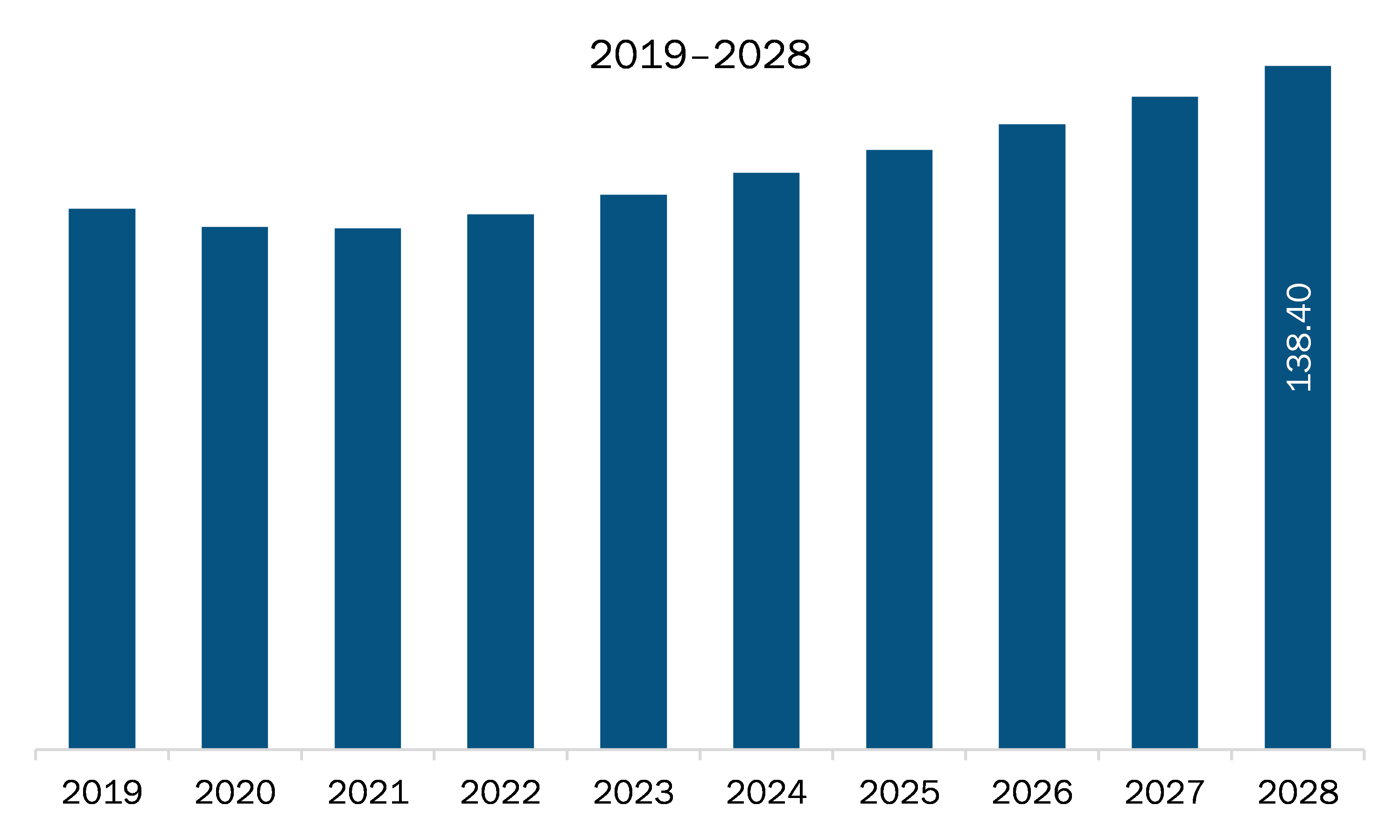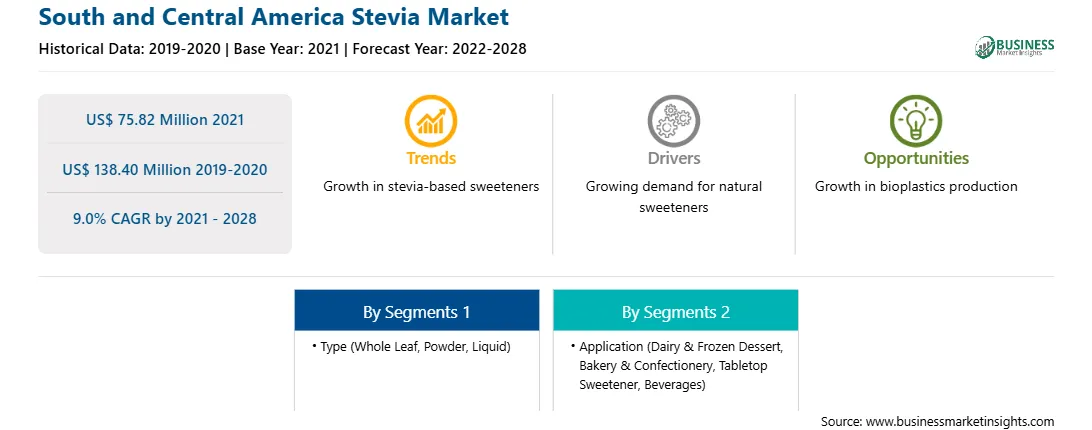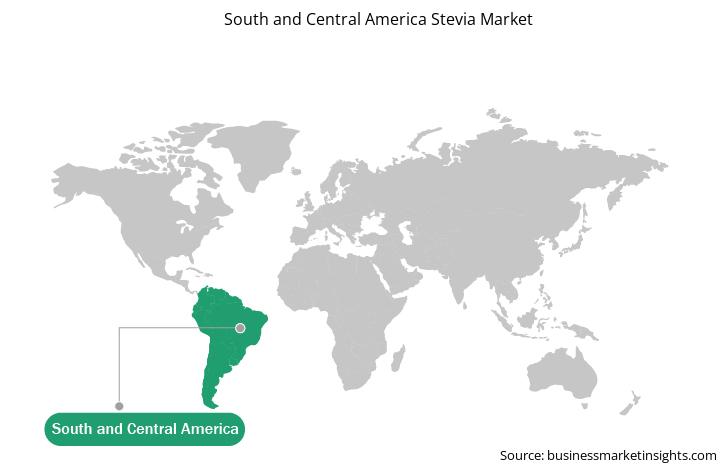The South and Central America stevia market is a highly fragmented market with the presence of considerable regional and local players providing numerous solutions for companies investing in the market arena. Stevia is now predominantly used to control calorie, carbohydrate, and sugar intake. Liquid stevia is used as an alternative for cane sugar in sweetening coffee, tea, and smoothies. Stevia is gaining traction in the beverage industry and being preferred by leading beverage manufacturers for strategic approaches such as innovation, artificial sweetener replacement, sugar moderation for kids, and cost savings. In 2017, Coca-Cola introduced a soft drink that included stevia. The coke containing stevia has less sugar and provides a unique taste. Various features of stevia such as zero calories, tooth-friendly, pH stable, non-fermenting, highly soluble, heat stable, and shelf-stable have increased the demand for stevia in the beverage industry. In a few instances, stevia can be applied as a flavor enhancer depending upon the type of beverage. Stevia can also be used for reducing the sugar levels in alcoholic beverages such as beer and cocktails. Thus, an increased application of stevia in the beverage industry is expected to drive the stevia market across the region.
In South and Central America, Brazil reported a huge number of COVID-19 cases, which led to the discontinuation of several business operations, including stevia production activities. Downfall of other food and beverages producing sectors negatively impacted the demand for stevia during the early months of 2020. However, the pandemic has been a reason for major shifts in consumer preferences with an increased awareness about having a healthy lifestyle. Consumers are substituting conventional ingredients with healthier alternatives, which is, in turn, increasing the demand for natural sweeteners such as stevia. An increase in the diet preference for no added sugars and low carbohydrates among consumers during the pandemic has led to an increase in the demand for stevia. During the pandemic, there has been rapid surge in demand for low sugar and immunity-boosting products due to which people are seeking solutions to improve their overall health and wellbeing. The COVID-19 pandemic has prompted customers to become health conscious and turn to low-calorie or sugar-free food. Hence, increasing health consciousness and high demand for sugar-reducing solutions among the populace of South and Central America has had a positive impact on the stevia market.

Strategic insights for the South and Central America Stevia provides data-driven analysis of the industry landscape, including current trends, key players, and regional nuances. These insights offer actionable recommendations, enabling readers to differentiate themselves from competitors by identifying untapped segments or developing unique value propositions. Leveraging data analytics, these insights help industry players anticipate the market shifts, whether investors, manufacturers, or other stakeholders. A future-oriented perspective is essential, helping stakeholders anticipate market shifts and position themselves for long-term success in this dynamic region. Ultimately, effective strategic insights empower readers to make informed decisions that drive profitability and achieve their business objectives within the market.

| Report Attribute | Details |
|---|---|
| Market size in 2021 | US$ 75.82 Million |
| Market Size by 2028 | US$ 138.40 Million |
| Global CAGR (2021 - 2028) | 9.0% |
| Historical Data | 2019-2020 |
| Forecast period | 2022-2028 |
| Segments Covered |
By Type
|
| Regions and Countries Covered | South and Central America
|
| Market leaders and key company profiles |
The geographic scope of the South and Central America Stevia refers to the specific areas in which a business operates and competes. Understanding local distinctions, such as diverse consumer preferences (e.g., demand for specific plug types or battery backup durations), varying economic conditions, and regulatory environments, is crucial for tailoring strategies to specific markets. Businesses can expand their reach by identifying underserved areas or adapting their offerings to meet local demands. A clear market focus allows for more effective resource allocation, targeted marketing campaigns, and better positioning against local competitors, ultimately driving growth in those targeted areas.

The stevia market in South and Central America is expected to grow from US$ 75.82 million in 2021 to US$ 138.40 million by 2028; it is estimated to grow at a CAGR of 9.0% from 2021 to 2028. The various developments in stevia sweeteners have led to increased use of the ingredient in a variety of product categories. Stevia-containing products are gaining more importance by the consumers, which helps to drive product purchases. Additionally, players operating in the stevia market are focusing on expanding their manufacturing facilities to support their customers in the region. Such efforts and high investment by the key players helps food and beverage manufactures in creation of zero-added sugar and reduced-sugar products. Thus, all these factors supports for the growth of the market in South and Central America region.
Based on type, the powder segment accounted for the largest share of the South and Central America stevia market in 2020. Based on application, the beverages segment accounted for the largest share of the South and Central America stevia market in 2020.
A few major primary and secondary sources referred to for preparing this report on the South and Central America stevia market are company websites, annual reports, financial reports, national government documents, and statistical database, among others. Major companies listed in the report include Cargill, Incorporated; Ingredion Incorporated; Tate & Lyle PLC; the Archer-Daniels-Midland Company; Sunwin Stevia International, Inc.; S&W Seed Company and PureCircle.
The South and Central America Stevia Market is valued at US$ 75.82 Million in 2021, it is projected to reach US$ 138.40 Million by 2028.
As per our report South and Central America Stevia Market, the market size is valued at US$ 75.82 Million in 2021, projecting it to reach US$ 138.40 Million by 2028. This translates to a CAGR of approximately 9.0% during the forecast period.
The South and Central America Stevia Market report typically cover these key segments-
The historic period, base year, and forecast period can vary slightly depending on the specific market research report. However, for the South and Central America Stevia Market report:
The South and Central America Stevia Market is populated by several key players, each contributing to its growth and innovation. Some of the major players include:
The South and Central America Stevia Market report is valuable for diverse stakeholders, including:
Essentially, anyone involved in or considering involvement in the South and Central America Stevia Market value chain can benefit from the information contained in a comprehensive market report.